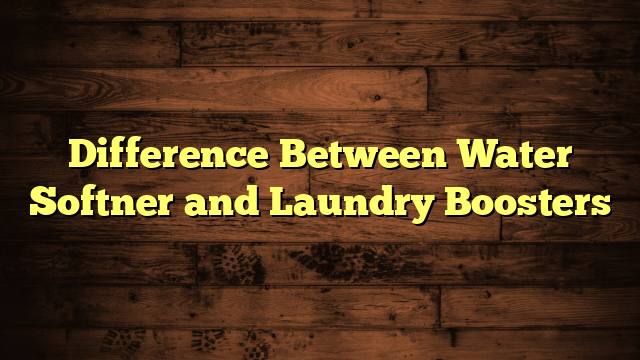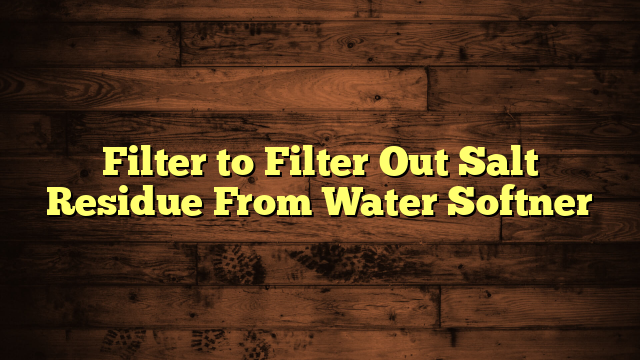Difference Between Water Softner and Laundry Boosters
You might say that maneuvering the world of laundry care can be a bit like choosing between two helpful friends, each with their own strengths. Water softeners and laundry boosters serve unique roles in ensuring your clothes come out looking their best. While one focuses on improving water quality over time, the other tackles immediate laundry challenges. Understanding when to rely on each can make all the difference in your laundry routine, but there's more to this story than meets the eye. What factors should you consider to optimize your results?
Key Takeaways
- Water softeners remove hard minerals like calcium and magnesium, enhancing detergent effectiveness in the long term.
- Laundry boosters enhance regular detergents for improved cleaning, targeting specific stains or fabric care needs per load.
- Water softeners are installed as a permanent home solution, while laundry boosters are temporary, used as needed.
- Water softeners improve fabric softness and reduce soap scum, while laundry boosters tackle tough stains and maintain whiteness.
- Utilizing both products together can maximize laundry results and extend the life of fabrics and appliances.
Understanding Hard Water
Hard water, often found in many households, contains high levels of minerals like calcium and magnesium. These minerals can create a range of hard water effects that you might notice in your daily life.
For instance, you may find that soap doesn't lather well, leaving your skin feeling dry and your hair looking dull. This is a direct result of mineral buildup, which can also impact your appliances.
Over time, hard water can lead to scale accumulation in pipes and appliances, reducing their efficiency and lifespan. You might notice spots on your dishes after washing them, as mineral deposits cling to surfaces.
Moreover, laundry done in hard water may feel stiff and look faded, making your clothes appear older than they are.
To combat these issues, many people look for solutions that address hard water effects, such as using specialized detergents or considering home treatments.
Understanding hard water is the first step in tackling its challenges, allowing you to make informed choices about how to improve your water quality and overall household experience.
What Is a Water Softener?
A water softener is a system designed to reduce the hardness of water, which is caused by high levels of calcium and magnesium.
It works through a softening process that exchanges these minerals for sodium or potassium ions, making your water gentler on your skin, appliances, and laundry.
Understanding how this process benefits you can help you appreciate the value of investing in a water softener for your home.
Softening Process Explained
Water softeners play a crucial role in improving the quality of your household water by removing minerals like calcium and magnesium that cause hardness.
The softening process primarily involves the use of softening agents, which typically include sodium ions. When hard water flows through the softener, it passes over resin beads coated with these sodium ions. This interaction triggers a process known as ion exchange.
During ion exchange, the calcium and magnesium ions in the water are attracted to the resin beads, and in return, the sodium ions are released into the water. As a result, you experience calcium removal, effectively transforming hard water into soft water. This process not only prevents limescale buildup in your appliances but also enhances the effectiveness of soaps and detergents, making your cleaning tasks easier.
Once the resin beads are saturated with calcium and magnesium, the water softener will regenerate. It rinses the beads with a concentrated salt solution, washing away the accumulated hardness minerals and recharging the sodium ions.
Understanding this softening process helps you appreciate the importance of regular maintenance for peak performance.
Benefits of Water Softening
Softening your water brings numerous benefits that can greatly enhance your daily life. When you tackle water hardness, you'll notice immediate improvements in your home and well-being.
Here are three key benefits of water softening:
- Better Cleaning: Soft water works more efficiently with soaps and detergents, allowing you to use less while achieving cleaner results. This means your laundry, dishes, and surfaces will shine brighter.
- Longer-Lasting Appliances: Hard water can lead to scale build-up in your appliances, reducing their lifespan. By using softening methods, you can prevent this damage, saving you money on repairs and replacements.
- Skin and Hair Care: Softened water is gentler on your skin and hair, reducing dryness and irritation. With fewer harsh minerals, you'll enjoy a more pleasant bathing experience.
Incorporating a water softener into your home not only addresses the challenges of water hardness but also promotes a healthier lifestyle and preserves your household investments.
Embracing these benefits means you can enjoy the perks of soft water every day, making your daily routines easier and more enjoyable.
Benefits of Water Softeners
When you install a water softener, you'll quickly notice a range of benefits that enhance your daily life. One of the most immediate improvements is in your water quality. Softened water doesn't contain the hard minerals that can cause scaling in your pipes and appliances, ensuring they operate more efficiently and last longer. This means fewer repair bills and less frequent replacements, contributing to your overall home maintenance.
Additionally, you'll find that your skin and hair feel softer and healthier. Hard water can leave your skin feeling dry and your hair looking dull, but softened water helps to alleviate these issues.
You'll also enjoy cleaner dishes and laundry, as softened water enhances the effectiveness of soaps and detergents, allowing them to lather better and rinse away more thoroughly.
Moreover, using a water softener can lead to significant savings on water heating costs. Since your appliances work more efficiently, they require less energy to heat water, which can lower your utility bills.
Ultimately, investing in a water softener not only improves your water quality but also simplifies your home maintenance routine and enhances your overall comfort.
What Are Laundry Boosters?
Many people don't realize the power of laundry boosters in enhancing your laundry routine.
These laundry additives work alongside your regular detergents to improve cleaning efficacy, making your clothes look and smell fresher.
Laundry boosters are effective cleaning agents that target specific laundry challenges.
Here are three common types of laundry boosters you might consider:
- Oxygen Bleach: This gentle yet powerful booster helps to remove stains and brighten whites without the harshness of chlorine bleach.
- Fabric Softeners: These additives soften fabrics, reduce static cling, and impart a pleasant fragrance, making your laundry feel fresher and more comfortable.
- Stain Removers: Formulated to tackle tough stains, these boosters can be applied directly to problem areas before washing, ensuring your clothes come out looking their best.
Incorporating laundry boosters into your wash cycle can greatly enhance the overall cleaning process.
By understanding how each type of booster works, you can tailor your laundry routine to address specific needs, ensuring your clothes aren't just clean, but truly refreshed.
Benefits of Laundry Boosters
When you use laundry boosters, you're boosting your clothes' cleaning power and stain removal efficiency.
These products help tackle tough stains and enhance the performance of your regular detergent, making sure your laundry comes out fresher and cleaner.
Enhanced Cleaning Power
For those looking to elevate their laundry routine, laundry boosters offer enhanced cleaning power that can make a noticeable difference. By complementing your regular cleaning agents, these boosters help guarantee your fabrics come out fresh and vibrant.
Here's how they enhance your laundry experience:
- Increased Detergency: Laundry boosters enhance the effectiveness of your detergent, allowing it to cut through tough grime and dirt more easily. This means cleaner clothes with less effort on your part.
- Fabric Care Improvement: Many laundry boosters contain ingredients that not only improve cleaning but also help preserve the integrity of your fabrics. They can maintain colors and prevent wear, making your garments last longer.
- Odor Neutralization: Laundry boosters often include powerful odor-fighting agents that tackle persistent smells. This means your clothes won't just look clean, but they'll smell fresh too.
Incorporating a laundry booster into your routine can greatly enhance your cleaning power, making laundry day less of a chore.
Stain Removal Efficiency
Stains can be a nightmare, but laundry boosters are here to help you tackle them head-on. When you add these powerful products to your wash, you greatly enhance stain removal, making it easier to get rid of tough marks on all types of fabrics.
Laundry boosters work alongside your regular detergent, improving its cleaning efficiency. This means that not only can they lift stubborn stains, but they can also help reduce the need for multiple wash cycles.
Whether you're dealing with food spills, grass stains, or grease, using a laundry booster can make a noticeable difference. These products often contain enzymes or oxygen-based cleaners that target specific stains, breaking them down more effectively than detergent alone.
Key Differences in Function
Understanding the key differences in function between water softeners and laundry boosters can help you choose the right solution for your laundry needs.
While both products aim to enhance your laundry experience, they work in distinct ways that impact their overall product effectiveness.
Here's a quick function comparison to clarify their roles:
- Water Softeners: These systems remove hard minerals like calcium and magnesium from the water. By softening the water, they help detergents work more efficiently, resulting in cleaner clothes and fewer soap scum issues.
- Laundry Boosters: These products are designed to enhance your existing detergent. They add extra cleaning power, tackling tough stains and odors that standard detergents might miss. They can also brighten colors and whiten whites.
- Usage Context: Water softeners are typically a long-term investment for your entire home, while laundry boosters are a short-term solution used on a per-load basis to enhance washing performance.
When to Use Each Product
Knowing when to use water softeners or laundry boosters can greatly improve your laundry results. Understanding your specific usage scenarios is key for effective product selection.
Water softeners excel in areas with hard water, effectively removing minerals like calcium and magnesium that can make your detergent less effective. If you notice soap scum, dingy whites, or stiff fabrics, it's likely time to invest in a water softener. On the other hand, laundry boosters work wonders when you need to enhance the cleaning power of your detergent, especially for tough stains or heavily soiled items.
Here's a quick reference table to help you decide:
| Usage Scenario | Recommended Product |
|---|---|
| Hard water issues | Water Softener |
| Tough stains | Laundry Booster |
| Dingy whites | Laundry Booster |
| Stiff fabrics | Water Softener |
| General cleaning enhancement | Laundry Booster |
Tips for Optimal Laundry Results
To achieve the best laundry results, it's important to combine the right products with effective techniques. By understanding how to use water softeners and laundry boosters together, you can enhance your fabric care routine.
Here are three tips to improve your laundry techniques:
- Sort Your Laundry: Always separate clothes by color and fabric type. This prevents color bleeding and guarantees each fabric receives the appropriate care it needs.
- Use the Right Amount of Products: Follow the manufacturer's instructions for both your detergent and any laundry boosters. Overloading on products can lead to residue buildup, which can actually dull your fabrics.
- Adjust Water Temperature: Pay attention to the care labels on your clothes. Using the correct water temperature can improve cleaning efficiency and protect delicate fabrics.
Incorporating these techniques not only helps in maintaining the quality of your garments but also maximizes the effectiveness of your laundry products.
Frequently Asked Questions
Can Water Softeners Prevent Mineral Buildup in Appliances?
Yes, water softeners can prevent mineral buildup in your appliances. By reducing hard water minerals, you enhance appliance longevity and efficiency. You'll notice fewer clogs and longer-lasting performance with softened water in your home.
Are Laundry Boosters Safe for All Fabric Types?
Think of laundry boosters like seasoning for your favorite dish; they enhance the flavor but might not suit every palate. For fabric safety, always check laundry compatibility; some fabrics might react differently to certain boosters.
How Often Should I Service My Water Softener?
You should service your water softener every 6 to 12 months for ideal performance. Regular water softener maintenance guarantees it operates efficiently, prolonging its lifespan and improving the quality of your water. Don't neglect it!
Can I Use Both Products Simultaneously?
Yes, you can use both products simultaneously. Water softener compatibility enhances your laundry booster's effectiveness, ensuring cleaner clothes. Just check the manufacturer's guidelines to confirm they won't interfere with each other's performance.
Do Laundry Boosters Work on Cold Water Cycles?
Yes, laundry boosters can work effectively in cold water cycles, enhancing the cleaning power of your detergent. Just verify your laundry detergent's compatibility with cold water for best results and to tackle tough stains efficiently.
Conclusion
In conclusion, understanding the difference between water softeners and laundry boosters can greatly enhance your laundry experience. While water softeners provide a long-term solution for hard water issues, laundry boosters tackle specific stains and odors on a per-load basis. So, why settle for less when you can achieve cleaner, fresher clothes effortlessly? By choosing the right product for your needs, you'll enjoy not only brighter laundry but also the longevity of your appliances.







